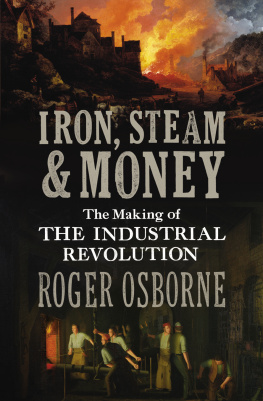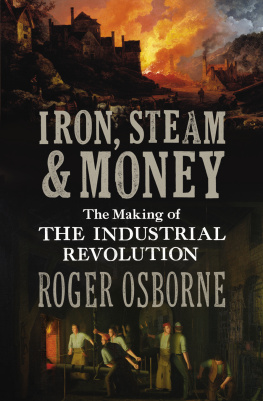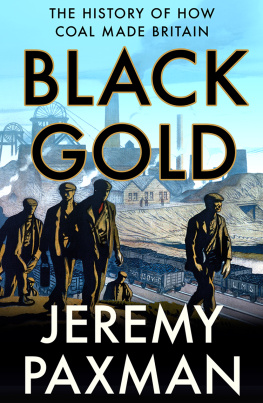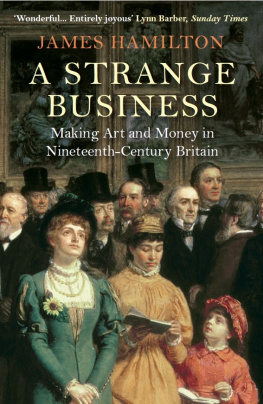Contents
List of Capsule Texts
About the Book
In late eighteenth-century Britain a handful of men brought about the greatest transformation in human history. Inventors, industrialists and entrepreneurs ushered in the age of powered machinery and the factory, and thereby changed the whole of human society, bringing into being new methods of social and economic organisation, new social classes, and new political forces. The Industrial Revolution also dramatically altered humanitys relation to the natural world and embedded the belief that change, not stasis, is the necessary backdrop of human existence.
Iron, Steam and Money tells the thrilling story of those few decades, the moments of inspiration, the rivalries, skulduggery and death threats, and the tireless perseverance of the visionaries who made it all happen. Richard Arkwright, James Watt, Richard Trevithick and Josiah Wedgwood are among the giants whose achievements and tragedies fill these pages. In this groundbreaking study Roger Osborne also shows how and why the revolution happened, revealing pre-industrial Britain as a surprisingly affluent society, with wealth spread widely through the population, and with craft industries in every town, village and front parlour. The combination of disposable income, widespread demand for industrial goods, and a generation of time-served artisans created the unique conditions that propelled humanity into the modern world.
The Industrial Revolution was arguably the most important episode in modern human history; Iron, Steam and Money reminds us of its central role, while showing the extraordinary excitement of those tumultuous decades.
About the Author
ROGER OSBORNE is the author of a dozen books that provide new insights into episodes, events and movements in world history. His major works include The Floating Egg: Episodes in the Making of Geology (1996) and Civilization: A New History of the Western World (2006). He is also a playwright; his political drama The Art of Persuasion was first performed in 2011.
Also by Roger Osborne
The Floating Egg:
Episodes in the Making of Geology
The Deprat Affair:
Ambition, Revenge and Deceit in French Indo-China
The Dreamer of the Calle de San Salvador:
Visions of Sedition and Sacrilege in Sixteenth-Century Spain
Civilization:
A New History of the Western World
The Art of Persuasion (play)
Of the People, By the People:
A New History of Democracy
Introduction
It is impossible to exaggerate the importance of the Industrial Revolution. Only the smelting of metals and the adoption of agriculture brought a comparable change in human history. Before the Industrial Revolution humanity, for all its ingenuity, lived in a precarious balance with the natural world.
In contrast the Industrial Revolution laid the foundations of a new world in which famine and want could be eliminated, where machines replaced human labour and where technology could be harnessed for the benefit of humankind. More than that, industrialisation changed the whole of human society, bringing into being new methods of social and economic organisation, new political forces and new social classes. The Industrial Revolution also had a transforming effect on human psychology, dramatically altering humanitys relation to the natural world and embedding the belief that change, not stasis, is the necessary backdrop to human existence. We have seen too the malign effects of industrialisation the despoliation of the natural world, pollution, climate change and increasing inequalities; the overthrow of that precarious balance has brought its own problems. For good or bad, so pervasive are the effects of the Industrial Revolution that it is impossible for us to comprehend human history without an understanding of this momentous episode: everything was changed forever.
What then was the Industrial Revolution? That may seem like an odd question. After all, every schoolchild knows about the spinning jenny, Samuel Cromptons mule and James Watts steam engine, even if we are a little vague about how they worked; and we all know about cotton factories, smoky cities and steam locomotives. All these, and much more, certainly came into being in Britain in the late eighteenth century but does this justify the claim that there was a revolutionary change in human existence?
In fact the very idea that there was an Industrial Revolution in Britain has come under attack from many quarters. Historians of technology have pointed out that important inventions have occurred throughout human history, often in clusters, so there is nothing unique about Britain in the late eighteenth century. In addition, several of the major innovations associated with the Industrial Revolution from Abraham Darbys blast-furnace technique to Thomas Newcomens steam engine and John Kays flying shuttle were invented decades before that period. Moreover, Britain had been developing a strong manufacturing and commercial economy since 1650, with large numbers of people involved in production of textiles, iron and steel, tin, copper, brass, metal goods, salt, glass, shipbuilding, coal mining, brick-making and construction.
Early eighteenth-century Britain already had a large urban population, boosted by the phenomenal growth of London in particular. Urbanisation became a crucial element in the process of industrialisation but London in 1700 managed to support half a million people through trade, commerce and craft-scale manufacturing. Historians have argued that the inventions of the classic period of the Industrial Revolution were mainly concerned with the cotton industry, but this remained a small part of the British economy until the first quarter of the nineteenth century, while the factory system did not make significant inroads until after the first great phase of the Industrial Revolution had passed. Economic historians have also pointed out that the British economy grew extremely slowly through the eighteenth century. Sustained growth the sign of a significant change in the productive capacity of the economy did not kick in until the middle decades of the nineteenth century, at a time when the likes of Richard Arkwright, James Watt, Henry Cort and Matthew Boulton were all in their graves.
All of this provides ammunition for the argument that Britain went through a long period of gradual and sustained change, the effects of which were felt only from the 1830s onwards. If the Industrial Revolution did bring about the alteration of human society, this process had begun much earlier and its effects were felt much later than we have been led to believe. The much-vaunted transformation begins to look less and less like a revolution and more like a gradual, centuries-long process.
And yet, the Industrial Revolution has emerged from this process of intense analysis bloody but unbowed, and in many ways stronger and more clearly defined. Historians have been forced to seek answers to fundamental questions. Firstly, if this was a revolution i.e. an episode of rapid and fundamental change then what exactly was that change? And second, what precisely do we mean by the word industrial?
The answer to the first question is that, in a period of just three and a half decades, a series of innovations ushered in an entirely new kind of productive economy. The spinning jenny, Arkwrights frame, Watts steam condenser, Cromptons mule, Corts new method of iron-making, the rotary steam engine, the automatic loom and Trevithicks steam locomotive all had effects which were threefold. Firstly, they laid the foundations for the mechanisation of industrial production the spinning frame and the mule, for example, were designed to be driven by external power not by human or animal muscle. Secondly, they brought in a new source of power for these machines steam engines. Thirdly, they adapted steam power to locomotion, opening up the possibility of rapid transport. All of this was brought into being between the registration of patents for Arkwrights frame and Watts steam engine in 1769, and Trevithicks successful trial of a steam locomotive at Pen-y-darren in 1804. This was, in any sense, a revolution in technology and the direct effects of these innovations were felt and appreciated at the time. Watt and Arkwright became famous in their lifetime and everyone soon saw that mechanised production powered by steam was opening up a new world.
Next page









